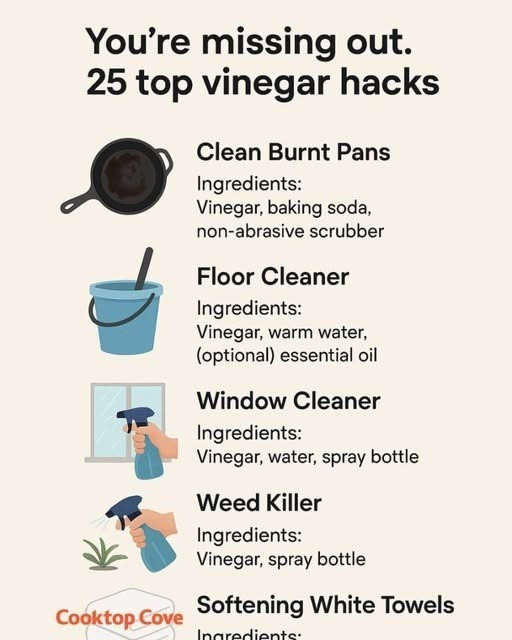ADVERTISEMENT
Vinegar is a staple in many households, not just for its culinary uses but also for its versatility as a cleaning agent, deodorizer, and more. This humble liquid, derived from the fermentation of ethanol by acetic acid bacteria, has been used for centuries across various cultures. Whether you’re looking to clean, deodorize, or even improve your personal care routine, vinegar offers a natural and cost-effective solution. Its acidic nature makes it a powerful tool for tackling a wide range of tasks, from cleaning burnt pans to softening laundry. Let’s explore 25 top vinegar hacks that you might be missing out on.
Understanding the Science Behind Vinegar's Effectiveness
The effectiveness of vinegar primarily stems from its acetic acid content, which typically ranges from 4% to 8% in most household vinegars. This acidity gives vinegar its characteristic sour taste and potent cleaning properties. Acetic acid can dissolve mineral deposits, grease, and grime, making it an excellent cleaner. Additionally, vinegar's antimicrobial properties help in killing bacteria and viruses, which is why it’s often used as a natural disinfectant. Understanding these properties helps explain why vinegar is such a versatile tool in the household.
Cleaning Burnt Pans with Vinegar
Burnt pans can be a nightmare to clean, but vinegar can make the job much easier. To clean a burnt pan, pour enough vinegar to cover the bottom of the pan and bring it to a boil. The acetic acid in the vinegar will help to loosen the burnt food particles. After boiling for a few minutes, remove the pan from the heat, and add a tablespoon of baking soda. This will cause a fizzing reaction that helps lift the burnt residue. After the fizzing stops, scrub the pan with a non-abrasive scrubber and rinse thoroughly.
Creating a Homemade Floor Cleaner
Vinegar can be used to create an effective and natural floor cleaner. Mix one cup of vinegar with a gallon of warm water to make a solution that can clean most types of flooring, including tile, vinyl, and laminate. The acidity of vinegar helps to cut through grime and dirt, leaving your floors sparkling clean. For a fresh scent, you can add a few drops of essential oil, such as lavender or lemon, to the mixture. This solution is not recommended for natural stone floors, as the acid can damage the stone.
Using Vinegar for Sparkling Windows and Glass
Achieving streak-free windows and glass surfaces is easy with vinegar. Mix equal parts of vinegar and water in a spray bottle. Spray the solution onto the glass and wipe with a microfiber cloth or newspaper for a streak-free shine. The vinegar cuts through dirt and grease, while the water helps to dilute the solution for a gentle clean. This method is not only effective but also eco-friendly and free from harsh chemicals.
Softening White Towels with Vinegar
Burnt pans can be a nightmare to clean, but vinegar can make the job much easier. To clean a burnt pan, pour enough vinegar to cover the bottom of the pan and bring it to a boil. The acetic acid in the vinegar will help to loosen the burnt food particles. After boiling for a few minutes, remove the pan from the heat, and add a tablespoon of baking soda. This will cause a fizzing reaction that helps lift the burnt residue. After the fizzing stops, scrub the pan with a non-abrasive scrubber and rinse thoroughly.
Creating a Homemade Floor Cleaner
Vinegar can be used to create an effective and natural floor cleaner. Mix one cup of vinegar with a gallon of warm water to make a solution that can clean most types of flooring, including tile, vinyl, and laminate. The acidity of vinegar helps to cut through grime and dirt, leaving your floors sparkling clean. For a fresh scent, you can add a few drops of essential oil, such as lavender or lemon, to the mixture. This solution is not recommended for natural stone floors, as the acid can damage the stone.
Using Vinegar for Sparkling Windows and Glass
Achieving streak-free windows and glass surfaces is easy with vinegar. Mix equal parts of vinegar and water in a spray bottle. Spray the solution onto the glass and wipe with a microfiber cloth or newspaper for a streak-free shine. The vinegar cuts through dirt and grease, while the water helps to dilute the solution for a gentle clean. This method is not only effective but also eco-friendly and free from harsh chemicals.
Softening White Towels with Vinegar
ADVERTISEMENT
